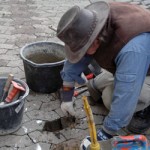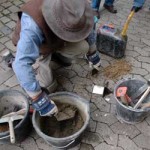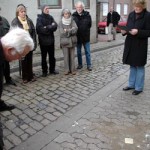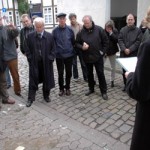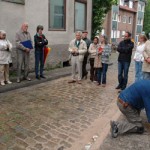Josef Schweid, Ehepaar Hartogsohn
Josef Schweid
Josef Schweid was born 1st December, 1902, in Warsaw, Poland. After serving an apprenticeship as a salesman he was a self employed Representative/General Agent. He lived at Videbullenstrasse 22, was arrested by the national socialist regime because he was a polish national and sent back over the border to Poland. From there he was able to make his way back to his place of birth, Warsaw. In the summer of 1939 he was allowed, with the permission of the German authorities, to return to Minden to put his business and private matters in order. As Nazi Germany raided Poland, before he was able to return to Warsaw, at the end of August, he was probably arrested on 1st or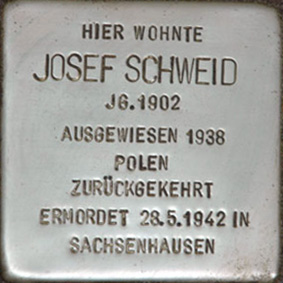 2nd September, 1939 and deported to Oranienburg. On 28th May, 1942, Josef Schweid was murdered in the concentration camp, Sachsenhausen where he was ordered to be shot. His widowed mother and his eight siblings managed to emigrate to New York. Josef Schweid had also made provision to emigrate to America in 1938. The American authorities had placed him on a list of willing immigrants and had informed him to be ready to leave at short notice.
2nd September, 1939 and deported to Oranienburg. On 28th May, 1942, Josef Schweid was murdered in the concentration camp, Sachsenhausen where he was ordered to be shot. His widowed mother and his eight siblings managed to emigrate to New York. Josef Schweid had also made provision to emigrate to America in 1938. The American authorities had placed him on a list of willing immigrants and had informed him to be ready to leave at short notice.
The Hartogsohn Family
The Jewish couple, Moritz and Meta Hartogsohn also lived at Videbullenstrasse 22.
Moritz Hartogsohn was born in Emden 9th October, 1877. There he attended secondary school and on leaving was taught the profession,
Tobacco Product Wholesaler. He ran his Wholesale and Tobacco Import businesses, in Emden, from 1905 onwards, on his own, a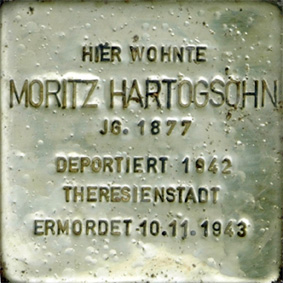 nd was registered on the stock exchange. In addition to that he was a self employed sales representative for relevant firms in Bremen and Hamburg. On 3rd October, 1907 he married Meta Ahrendt, born 9th April, 1882, in Bielefeld, and on 10th July, 1908, they had a son, Walter. Moritz was a soldier serving from 1914 until 1918 in the First World War. He was promoted to Sergeant and was presented with the Iron Cross 2nd Class and the Front Cross of Honour.
nd was registered on the stock exchange. In addition to that he was a self employed sales representative for relevant firms in Bremen and Hamburg. On 3rd October, 1907 he married Meta Ahrendt, born 9th April, 1882, in Bielefeld, and on 10th July, 1908, they had a son, Walter. Moritz was a soldier serving from 1914 until 1918 in the First World War. He was promoted to Sergeant and was presented with the Iron Cross 2nd Class and the Front Cross of Honour.
In March 1915 the family moved to Minden. In Koenigstrasse 77, where the family lived, Moritz Hartogsohn founded a tobacco import and wholesale firm and opened a shop selling tobacco wares next to it.
He was a successful well known business man and the family were financially well off and able to live comfortably. After 1933 the family and the business suffered under the increasing harassment and boycott measures, resulting in Moritz Hartogsohn having to finish trading in 1936. In March 1938 or the Spring of 1939 (the exact point in time is not known) he applied to emigrate to Holland. His son Walter emigrated early enough and had lived thee since 1933. Permission for the emigration was refused. The application required Moritz Hartogsohn to make a list of his finances and of the goods he intended taking with him, to be submitted to the Head Finance Office in Muenster. This statement confirmed that the family’s financial situation was above average.
After the beginning of the war the couple, like many other Jews, had to relinquish their homes and move into the so called ‘Jewish House’ at Koenigstrasse 37, where they were put under heavy pressure with persecution and harassment. In 1941 Moritz Hartogsohn submitted application to emigrate to the USA at the American Consulate in Stuttgart but the entry of the USA in the war made the application invalid.
There are two sources both giving conflicting information as to the 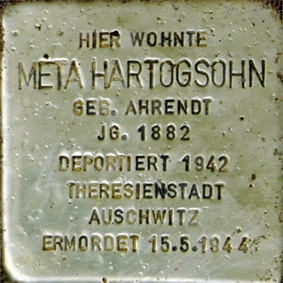 destiny of Meta and Moritz Hartogsohn. One says that they were arrested at the end of 1941 or beginning of 1942, deported to the Riga
destiny of Meta and Moritz Hartogsohn. One says that they were arrested at the end of 1941 or beginning of 1942, deported to the Riga
Ghetto and later taken together to the concentration camp at Theresienstadt. From there they were taken to the concentration camp at Ausschwitz where they were murdered. The second source says that they were arrested on 28th July, 1942, and taken to Bielefeld and from there were deported to Theresienstadt on 31st July, 1942, where Moritz Hartogsohn died on 10th November, 1943. His wife Meta was, according to this source, deported to Auschwitz and murdered on 15th May, 1944. Both were declared dead on 31st December, 1945.
Like all Jews the Hartogsohn’s lost all rights to their property when they were arrested and deported. It was confiscated and auctioned by the Minden Municipality, far below it value, whereby a large part of the furniture and jewellery vanished without trace. On the 13th October, 1942, The Finance Office, Minden, transferred 241,-Reich Mark to the Head Treasury Office, Muenster, as a result of the auction of the household goods. Their son Walter, who survived the Nazi regime and the Holocaust, received 7.000,-Deutsch Mark in compensation after the war.


